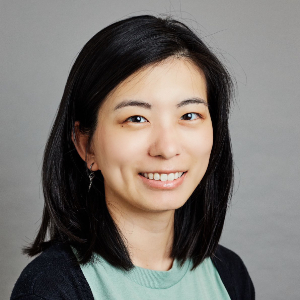Indiana University School of Public Health (SPH-B) is pleased to share that effective this month, Jingyi Wang, Ph.D. is director of the Didactic Program in Dietetics in the Department of Applied Health Science. Wang takes the torch from Victoria Getty, who has held the position since July 2000.
Wang shadowed Getty over the course of the 2024–25 academic year, giving Getty ample time to impart her wisdom and ensure a smooth transition.

"It is hard to step away from a position you have held for 25 years," says Getty. "I had the benefit of a transition time, and it was important to me for Jingyi to have that as well."
The program is accredited by the Accreditation Council for Education in Nutrition and Dietetics (ACEND). A registered dietitian (RD) and a Ph.D. graduate of IU Bloomington, Wang’s interest in nutrition began as a child when her older cousin had difficulty seeing at night.
"My father, who has some medical background, mentioned my cousin needed to eat more Vitamin A," says Wang. "I didn’t realize at that time what we eat could affect our health so significantly."
When Wang went on to become a student mentor in her undergraduate years at IU Indianapolis, her peers would often arrive for a session with low energy or have noticeable trouble focusing.
"When I asked them about it, they would often say they skipped breakfast or were so busy running around to different classes they forgot to eat," says Wang. "That was my second big exposure to nutrition and seeing what we put in our body can significantly affect how we interact with our environment."
Wang’s passion for community involvement and hands-on experience in nutrition was fostered during her time as a senior dietitian for Providence Health & Services in Seward, Alaska, where she helped found a local chapter of the Centers for Disease Control (CDC)–recognized National Diabetes Prevention Program.
Wang adds, "The town only had 3,000 people, so I was involved in a little bit of everything. That got me involved in the community nutrition and engagement aspect of the field…being a friendly local face helped get people more excited about nutrition."

Being the only dietitian in town also helped Wang hone her ability to plainly communicate the science behind nutrition so it can be widely understood—a skill she is passionate about cultivating in students. Other goals include expanding community engagement opportunities to raise awareness about what dietitians do and exposing misconceptions about this field of research.
"RDs have the training and background to understand the science behind nutrition, not be swayed by misinformation, and apply that knowledge to individuals and groups," says Getty. "Even then, lasting behavior change for the general public or patients can be difficult, making dietetics a challenging profession."
Wang was surprised by the sheer volume of materials Getty had to keep track of and looks forward to effectively balancing “big picture” thinking with high attention to detail.
"You have to track the competencies and see if the students are meeting them—and if they are not, are they doing the remediations, and are they seeing success?" says Wang. "Also, you need to make sure the instructors know what the remediation process is. It’s a lot of details to stay on top of."
As Getty prepares to return to full-time teaching in 2025–26, she leaves a legacy of mentorship—an estimated 732 students Getty has seen through the program.
"The vast majority have gone onto be RDs and we have a very high placement of students into supervised practice," says Getty. "That is 732 people who I helped get where they wanted to go and something I am proud of."
And Getty can add one more to the list.
"I can’t imagine stepping into this role without Vicky’s mentorship and guidance," says Wang. "She has been such a wealth of information to me, and I feel thankful to continue to have her support for the new academic year."
For more SPH-B news, visit go.iu.edu/48bx.


